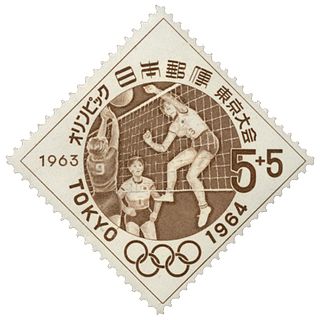
The judo competition at the 1964 Summer Olympics was the first time the sport was included in the Summer Olympic Games. As a result, decades of judo being officially banned as an "imperialist sport" in the Soviet Union ended shortly before the Games started, as Soviet authorities prioritized winning medals over anything else. The medals were awarded in 4 classes, and competition was restricted to men only. The competition was held in the Nippon Budokan, which was built to host the competition.

National Stadium was a multi-purpose stadium in Kasumigaoka, Shinjuku, Tokyo, Japan. The stadium served as the main stadium for the opening and closing ceremonies, as well as being the venue for track and field events at the 1964 Summer Olympics. The Japan national football team's home matches and major football club cup finals were held at the stadium. The stadium's official capacity was 57,363, but the seating capacity was only 48,000 seats.
The boxing competition at the 1964 Summer Olympics was held from 11 to 23 October. The competition was for men only and there were ten weight classes.

Tokyo Metropolitan Gymnasium is a sporting complex in Sendagaya, Shibuya, Tokyo, Japan. Built in 1954 for the World Wrestling Championship, it was also used as the venue for gymnastics at the 1964 Summer Olympics, and hosted the table tennis competition at the 2020 Summer Olympics. The gymnasium was rebuilt to a futuristic design created by Pritzker Prize winner Fumihiko Maki from 1986 to 1990.

At the 1964 Summer Olympics, fourteen different artistic gymnastics events were contested, eight for men and six for women. All events were held at the Tokyo Metropolitan Gymnasium in Tokyo from 18 October through 23 October.

The NHK Spring Mitsuzawa Football Stadium is an association football stadium in Kanagawa-ku, Yokohama, Japan. It serves as a home ground of Yokohama FC and, on occasion, Yokohama F. Marinos. Until 1999 it had been the home of Yokohama FC's spiritual predecessor, Yokohama Flügels, and also, on occasion, of Kawasaki-based NKK FC. The stadium holds 15,454 people.

At the 1964 Summer Olympics in Tokyo, eighteen swimming events were contested, ten for men and eight for women. There were a total of 405 participants from 42 countries competing. For the first time, the 4 × 100 metres freestyle relay for men and the 400 metres individual medley for both men and women were contested. Olympic records were broken in all events and the world record was broken in ten events. This competition also marked the debut of electronic touchpads for timing.

At the 1964 Summer Olympics, 16 wrestling events were contested, for all men. There were eight weight classes in Greco-Roman wrestling and eight classes in freestyle wrestling.

Rowing at the 1964 Summer Olympics featured seven events, for men only.

The 1964 Summer Olympics was the first time that volleyball had been held as an Olympic sport. The sport would feature two medals during this games with the men's and women's indoor teams events. In both tournaments, the format was the same with a single round robin between all of the teams that was competing in the tournament.

Canoeing at the 1964 Summer Olympics was held between 20 October 1964 and 22 October 1964 on Lake Sagami, 60 kilometres from Sagamiko, Kanagawa, Japan. There were 7 events, 5 of which were for men and 2 for women. Both of the women's events were 500 metre kayaking events; there were three kayaking and two canoeing events for men, all of which covered 1000 metres. The K-4 event for men was introduced to the Olympic program at these Games, replacing the 4×500 metre K-1 event that was raced in the 1960 Games.

At the 1964 Summer Olympics in Tokyo, four diving events were contested during a competition that took place at the Yoyogi National Gymnasium, from 11 to 18 October, comprising 80 divers from 20 nations.

Water polo at the 1964 Summer Olympics was held at the Yoyogi National Gymnasium in Shibuya, Tokyo. The gymnasium was built in 1961-1964 as the first indoor pool for Olympic water polo; it also hosted all swimming and diving events and could accommodate over 13,000 people.

Shibuya Public Hall is a theatre located in Shibuya, Tokyo, Japan. It was completed in 1964 to host the weightlifting events in the 1964 Summer Olympics.

Camp Asaka is a base of the Japan Ground Self-Defense Force. It lies in four municipalities: Nerima, Tokyo; Asaka, Saitama; Wako, Saitama; and Niiza, Saitama. It serves as the headquarters of the Eastern Army.

The Komazawa Volleyball Courts are a volleyball venue located in Tokyo, Japan. It hosted some of the volleyball preliminaries for the 1964 Summer Olympics.

The Toda Rowing Course is a venue that hosted the rowing event at the 1964 Summer Olympics. Originally completed in 1939 for the 1940 Summer Olympics that were cancelled due to World War II. After World War II, the venue was left in disrepair. When Tokyo was awarded the 1964 Summer Olympics in 1958, the venue was expanded and reconstructed.

The Royal Park Shiodome Tower (ロイヤルパーク汐留タワー) is a skyscraper located in Minato, Tokyo, Japan. Construction of the 172-meter skyscraper was finished in 2003.
Mönkhjantsangiin Ankhtsetseg is a Mongolian weightlifter, competing in the 81 kg category and representing Mongolia at international competitions.

The Musashino Forest Sport Plaza is a multi-sport venue located in Chōfu, Tokyo, Japan. The main arena has a seating capacity of over 10,000, and also includes a swimming pool, a gym, a multi-use sports area and two fitness studios, that is available for use by the general public. It is the first new venue completed for Tokyo 2020. Construction took three and a half years and cost over $300 million to complete.



















